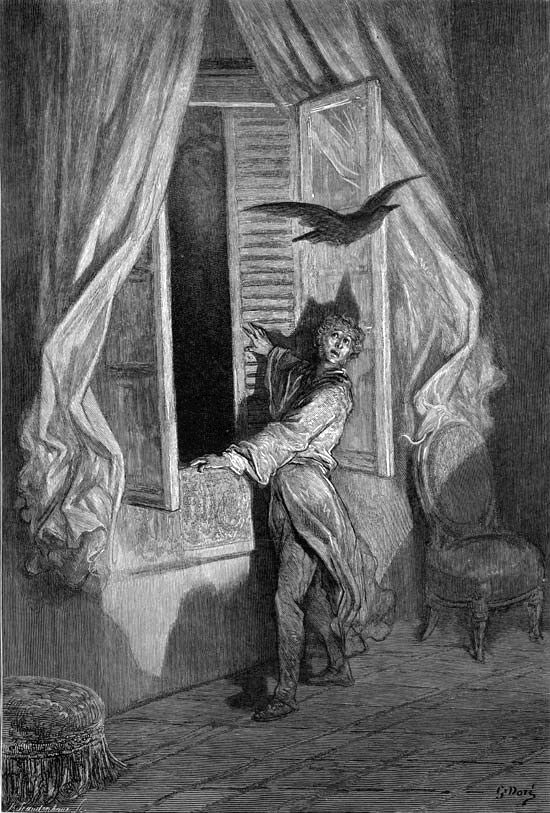Edgar Allan Poe (E. A. P.) hardly needs any introduction. He was an extraordinary writer with a great analytical mind, what was reflected both in his prose and poetry. He was the pioneer in several genres, like the Detective Fiction story, and the emerging Science Fiction. Additionally, Cryptography, Philosophy, Mathematics, Psychology, Cosmology, and Physics were among his interests. He also had a very definite inclination to the Macabre and Supernatural. What may surprise some is that his best-seller was not one of his now famous stories or poems. It was a scientific work called The Conchologist’s First Book about seashells. The book was intended to be used as a textbook in schools. It was the only one of his books to go into a second edition during his lifetime. He didn’t write the entire book though, but that is a story for another day…
As it happens, next generations often fall out of touch with the people from the past. It seems, though, that we are experiencing a Poe revival right now. This is also happening with Agatha Christie and Sherlock Holmes.
If not, let us consider the evidence before us, in an analytical manner, as Poe would certainly have approved.
Exhibit A – Soul of a man
This is a charming short film that you can watch for free on Youtube and was released about one year ago (if you remember, we were still not completely out of the woods by then in what regards the pandemic…). It’s based on the short story Bon-Bon. The narrative involves a philosophical and metaphysical discussion with none other than “His Majesty”, the Devil. They talk about what is the essence of the soul of the man. Cheers to Sigmund the Cat, the adorable third character on this adaptation.
Exhibit B – The Fall of the House of Usher

That is an upcoming TV Series to be premiered on Netflix. It is directed by Mike Flanagan. He is the creator of other horror gems like The Haunting of Hill House, adapted from Shirley Jackson’s story with the same name. There is also The Haunting of Bly Manor, adapted from The Turn of the Screw by Henry James. Additionally, he created Midnight Mass. Based on his earlier works, my expectations are set high. I look ahead to this rendering of Poe’s gothic story and other tales.
Poe was a master in setting the emotional tone for his narrative, what can be seen in the opening lines for this one:
During the whole of a dull, dark, and soundless day in the autumn of the year, when the clouds hung oppressively low in the heavens, I had been passing alone, on horseback, through a singularly dreary tract of country; and at length found myself, as the shades of the evening drew on, within view of the melancholy House of Usher.
The Fall of the House of Usher by Edgar Allan Poe
Exhibit C – Wednesday
The references to E. A. P in the series are abundant: the name of the new school where Wednesday goes to is “Nevermore Academy”; there are plenty of ravens in the Principal’s office and elsewhere in the school; there’s a secret society whose meeting place is behind a statue of Poe (with, guess what? a raven!), where an enigma needs to be solved, etc. But in my opinion these references are a bit superficial. I would like to see more of his stories or even a rendition of The Raven at some point. In any case, it’s a good attempt to bring the new generations to get curious about him.

“… Tell me what thy lordly name is on the Night’s Plutonian shore!” Quoth the Raven, “Nevermore.”
The Raven by Edgar Allan Poe
Exhibit D – The Pale Blue eye

The recognition of E. A. P. on this one comes in two fronts. A novel by Louis Bayard was published in 2003. A movie was just released by Netflix. The homage to Poe is there from beginning to end, from the title (The Tell-Tale Heart), to the name of the detective (Monsieur C. Auguste Dupin, Landor’s Cottage), to Poe’s sweetheart (Lea, Lenore), among so many others.
Harry Melling is perfect in the interpretation of E. A. P., and Christian Bale is very convincing as the smart but troubled detective that investigates the case. Their relationship is reminiscent of Sherlock Holmes and Watson. Perhaps, it is more akin to Auguste Dupin and his unnamed sidekick in Poe’s detective stories. As it is only expected, you can count on plot twists.
… I think it was his eye! yes, it was this! He had the eye of a vulture—a pale blue eye, with a film over it. Whenever it fell upon me, my blood ran cold; and so by degrees—very gradually—I made up my mind to take the life of the old man, and thus rid myself of the eye forever.
The Tell-Tale Heart by Edgar Allan Poe
In conclusion, I strongly believe that Edgar Allan Poe is back in the public imagination. We will never have enough of him. So, keep it coming. He touched on a vast amount of subjects in his works. We can always find something to revisit. By the way, choosing where to start with him can be a little overwhelming. His labored English from two centuries ago may sound archaic to our ears. But if you have not read anything from him yet, I would suggest The Black Cat. It’s one of my favorite stories.

You must be logged in to post a comment.